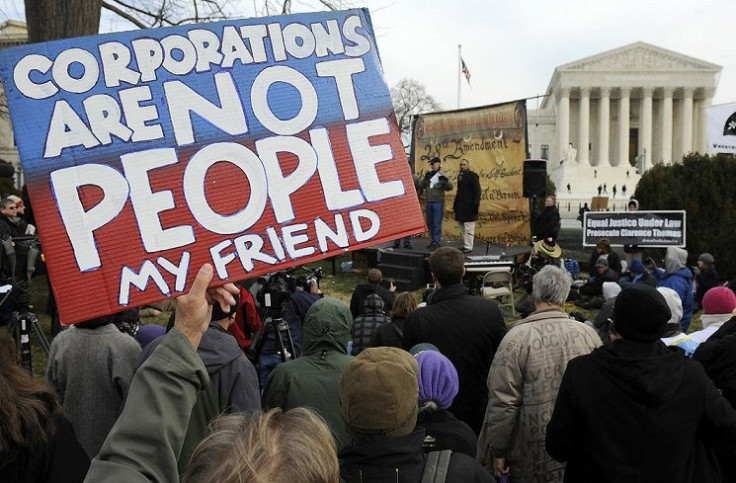Hobby Lobby Supreme Court Case Sparks Fierce Battle Over Women’s Rights, Religious Freedom And Corporate Personhood

Depending on which side of the political fence you fall on, two cases being argued before the U.S. Supreme Court on Tuesday threaten to either radically undermine religious freedom or viciously curtail reproductive rights. But as is the case with any high-profile scuffle, the nuances are getting buried under the din of politically charged discourse.
The basic facts of the cases are relatively straightforward: Hobby Lobby Stores Inc. and Conestoga Wood Specialties Corp. -- two privately held companies based in Oklahoma City and East Earl, Pa., respectively -- are suing the U.S. government over an Obamacare provision that requires large for-profit companies to provide their employees with preventative health care, including all contraceptives approved by the FDA. The founders of both companies are highly religious and object to emergency contraceptives such as the morning-after pill, as well as the IUD (intrauterine device) method of birth control, as both types prevent an already-fertilized egg from implanting in the uterus. They believe these methods are equivalent to abortion.
As Mandi Broadfoot, a Hobby Lobby employee, explained in this YouTube video, the company’s owners, the Green family, claim to have “no objection to preventative birth control” (such as diaphragms or condoms), and in fact such contraceptives are covered under current Hobby Lobby employee health plans. But the owners believe that “life begins at conception,” the moment an egg is fertilized, and therefore take issue with methods they believe may interrupt that process. “FDA guidelines clearly state that the morning-after and the week-after pill may prevent a fertilized egg from implanting in the womb,” Broadfoot says in the video. “This aborts a fertilized egg.”
Not everyone agrees with that assessment. Susan Wood, a former assistant commissioner for women’s health at the FDA, told NPR last month that the pills Green objects to, sold under the brand names Plan B and Ella, are not “abortifacients,” in that they don’t interrupt a pregnancy. “Their only connection to abortion is that they can prevent the need for one,” Wood told NPR.
At the heart of the cases, however, is not how the pills work but whether Hobby Lobby and Conestoga Wood have a right to deny their employees access to these legal medications. (Hobby Lobby, with 13,000 employees and some 500 locations, is much the larger company and has received the lion’s share of media attention.) While the Obamacare provision at issue provides an exemption for religious nonprofits, for-profit corporations are required to comply with the mandate, despite any religious objection the people who own and run them may have. The standoff raises the question of so-called corporate personhood, and whether for-profit entities are entitled to the same basic First Amendment protections as individuals.
It’s not an idea without legal precedent. In the landmark and much-criticized Citizens United ruling of 2010, the Supreme Court held that the government could not restrict a corporation or union from expressly advocating for a political candidate’s election or defeat. The decision, which ushered in a new era of unchecked super PACs, sprung from the idea that corporate entities have the same free-speech rights as individuals.
But unlike in the Citizens United case, the idea of a for-profit corporation exercising religious freedom is largely untested, so whatever arguments unfold on Tuesday, it will be an uphill climb for the two companies involved. Specifically, the court is looking at the Religious Freedom Restoration Act of 1993, which provides that the government “shall not substantially burden a person’s exercise of religion.” The crux of the cases hinge on whether or not that law can be applied to a for-profit company.
In the meantime, the cases are playing out, as do so many notable conflicts, in the court of social media. Throughout the morning on Twitter, dueling hashtags such as #NotMyBossBusiness and #ReligiousFreedomforAll have been vying for attention on trending sidebars. And on the Hobby Lobby Facebook page, users are expressing their views, with new comments pouring in every few minutes, both pro and con.
“United as one voice under our Lord and Savior we will be victorious,” one person wrote. “Do not back down on this issue. We have rights like every other religious organizations. We Christians keep making concessions for other religious rights but our own. No More!”
“Your attitude towards your female employees reflect your attitude towards me as a female customer,” wrote another. “How dare you. You have lost my business.”
Updates on the two cases can be found at the SCOTUS blog.
© Copyright IBTimes 2025. All rights reserved.






















